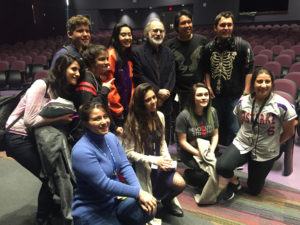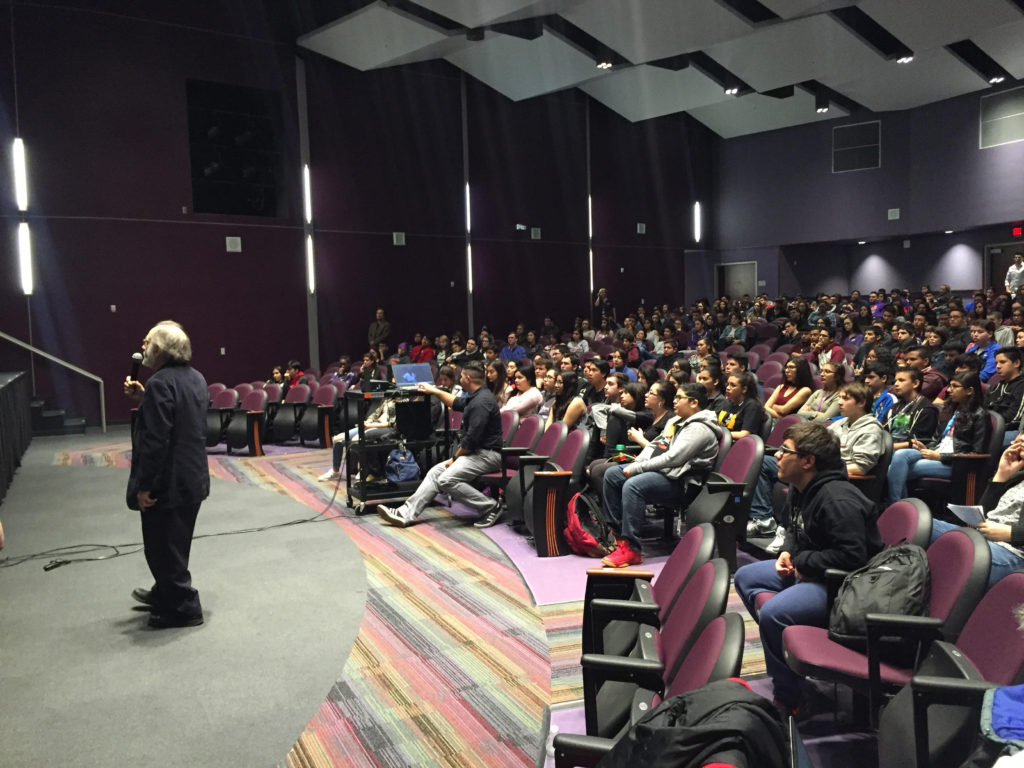 You’re looking at a photo of me – the old guy with the beard – being thanked by students at East Lake High School, a semi-rural public high school on the outskirts of El Paso, Texas. Five hundred East Lake students had just spent 90 minutes watching and listening to a presentation sampling Redes (1935) – the iconic film of the Mexican Revolution, a tale of exploited fishermen who unite and revolt.
You’re looking at a photo of me – the old guy with the beard – being thanked by students at East Lake High School, a semi-rural public high school on the outskirts of El Paso, Texas. Five hundred East Lake students had just spent 90 minutes watching and listening to a presentation sampling Redes (1935) – the iconic film of the Mexican Revolution, a tale of exploited fishermen who unite and revolt.
As readers of this blog know, Redes is an obsession of mine. However little acknowledged, it’s one of the peak examples, in all cinema, of great music wedded to great cinematography. As the composer is Silvestre Revueltas, and the cinematographer Paul Strand, Redes also documents a historic Mexican/American collaboration during a decade when Diego Rivera’s Mexico exemplified how artists and intellectuals could power social change. Here’s a galvanizing Redes sequence: the funeral of a child.
For Naxos, my DC-based PostClassical Ensemble (I’m Executive Director) has produced a DVD mating Redes to a freshly recorded soundtrack. It’s that DVD that I sampled for the East Lake students as part of a week-long El Paso festival, “Copland and Mexico.” As I’ve previously written, El Paso (about 80 percent Hispanic) is an ideal incubator for impactful art.
“Copand and Mexico” is a product of Music Unwound, the NEH-supported national consortium of orchestras, festivals, and universities that I direct. In El Paso, the festival included (among many other activities) three screenings of Redes with live accompaniment by the El Paso Symphony. The third of these was a free performance in neighboring Juarez, Mexico. The Juarez audience was unlike any I have previously witnessed at a symphonic performance. Many families attended. The hall – an exemplary 10-year-old facility on the campus of the university – was full of children. Everyone was raptly attentive. I have little doubt that for many of those who came, the story of the cultural efflorescence that drew Copland, Strand, Steinbeck, Eisenstein, and Langston Hughes to Mexico – a phenomenon concurrently explored in many classrooms at the remarkable University of Texas/El Paso — was a revelation.
The El Paso “Copland and Mexico” festival was covered by Armando Trull of National Public Radio. He filed two stories: one on NPR, another for The Huffington Post. The interviews included one with a fifteen-year old who attended a Redes presentation at Tornillo High School. Thirty miles south of El Paso, Tornillo (population 3,000) is a “colonia.” So is East Lake — certified by the State of Texas as “a residential area along the Texas-Mexico border that may lack some of the most basic living necessities, such as potable water and sewer systems, electricity, paved roads, and safe and sanitary housing.” The young man in Tornillo told Trull: “It’s important [for us] to know that there are Mexican composers and artists who became successful.” Tornillo students were bussed to the El Paso Symphony concert.
Trull’s story instantly provoked a listener response on the NPR site. It read:
“Propaganda festival. Get rid of the National Endowment for the Humanities. Totally unnecessary government office. If you want to talk about the contributions of Mexicans, you need to cover the whole spectrum. 7 out of 10 federal foreign prisoners in this country are from Mexico. Their welfare usage rates are much higher than the general population and their tax contributions are significantly lower. Mexican immigrants (legal and illegal) drive down wages for American workers. Billions of dollars of drugs (and associated crime) pour across the Mexican border every year, which is tragically killing our young people and destroying our society.”
In fact, far from being conceived as a propaganda instrument challenging our new President, the Music Unwound “Copland and Mexico” presentation – a multi-media exegesis with an actor, an orchestra, and a continuous visual track additional to Redes — originated in 2012. The first consortium participant was the Louisville Orchestra. From there “Copland and Mexico” was taken up by the Austin Symphony, the North Carolina Symphony, and the Buffalo Philharmonic. The script used in El Paso was verbatim what I wrote five years ago in the conviction that culture can be a potent tool for human betterment and mutual understanding.
I have never been more convinced of that than I am today.
“Copland and Mexico” will next travel to the New Hampshire Music Festival, then the Las Vegas Philharmonic, then the South Dakota Symphony, then the Brevard Music Center. Its pertinence will not fade. Check out the eyes of the East Lake students in the photo below. They are discovering Redes.
(Please note that the views expressed by this posting do not necessarily represent those of the National Endowment for the Humanities.)


This is so sensational Joe ! I always learn something from you !!
Always interesting travels that place music in a new light. The international domain of music is a great example of why America needs to continue her tradition of being open to a broad world of cultural influences that flows in both directions. The short-sighted policies of the barbarians in power fail to recognize what makes America great.